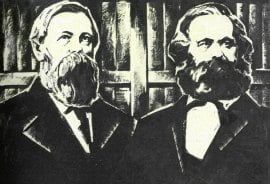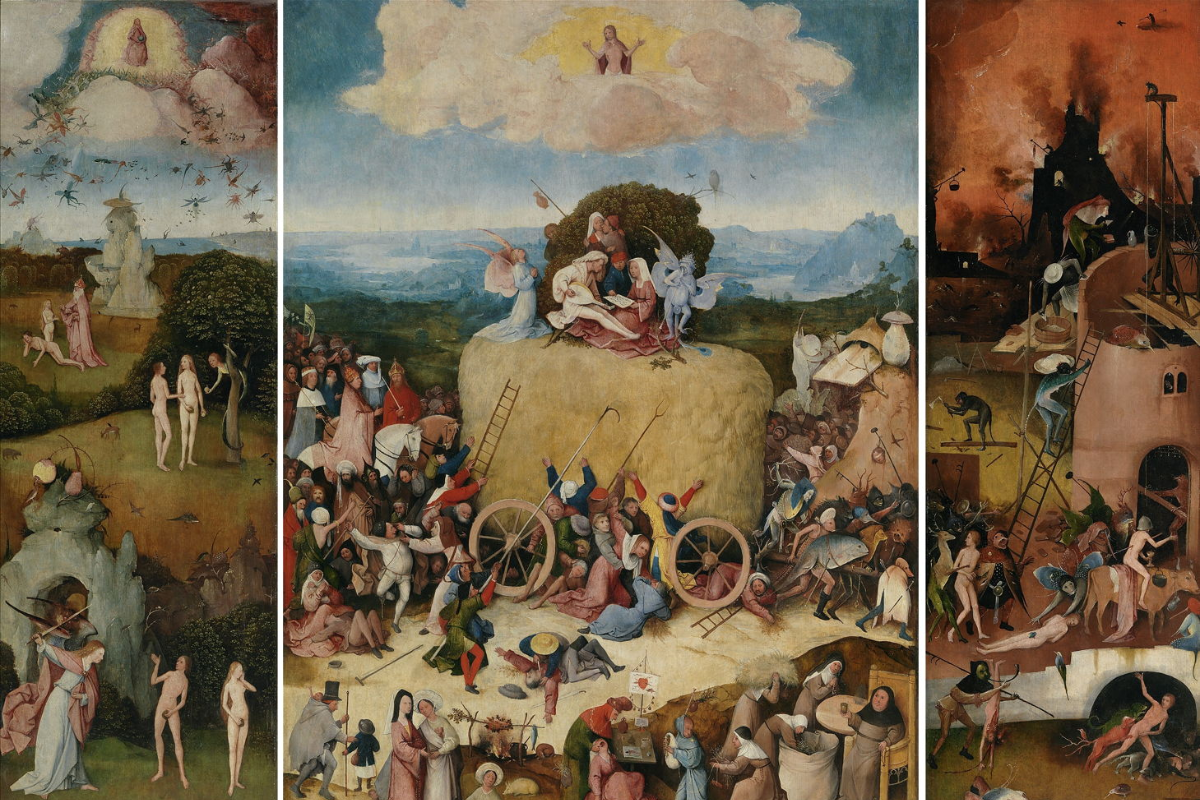Marxism is often referred to as ‘scientific socialism’, as it is based upon a materialist analysis of history and society, looking at social and economic systems in their historical development. This materialist understanding of capitalism underlines why socialism isn’t just a nice idea or an ‘alternative’ to capitalism, but is actually an essential solution to the problems inherent in the capitalist system. Michael Allan of the Glasgow Marxists explains the contradictions of capitalism highlights the potential for a socialist society that is free of such contradictions.
To understand what socialism would look like, what it actually is, and present the case for it, it is essential to look at the present economic system – capitalism – and understand its nature. Karl Marx and Freidrich Engels did this over 150 years ago. They developed a thorough understanding of the nature of the capitalist system and their writings are still an incredibly – almost eerily – accurate analysis and critique of capitalism.
Marxism is often referred to as ‘scientific socialism’, as it is based upon a materialist analysis of history and society, looking at social and economic systems in their historical development. This materialist understanding of capitalism underlines why socialism isn’t just a nice idea or an ‘alternative’ to capitalism, but is actually an essential solution to the problems inherent in the capitalist system.
Capitalism: an ‘efficient’ system?
The dominant narrative of the past three decades is that the free market is the most efficient economic system available, and, whilst not flawless, has nevertheless allowed for greater production and year-upon-year increases in living standards.
The collapse of the Soviet Union in 1991, and with it a living alternative to capitalism, was hailed as the ‘end of history’ by US academic Francis Fukuyama. Western ‘liberal democracy’ and the market economy were heralded as the crowning achievement of mankind and the pinacle of human development.
In Fukuyama’s own words, “…what we may be witnessing is not just the end of the Cold War, or the passing of a particular period of postwar history, but the end of history as such…. That is, the end point of mankind’s ideological evolution and the universalization of Western liberal democracy as the final form of human government.”
This encapsulated the triumphant mood of the capitalist class in this period. Twenty years later, with the greatest crisis of capitalism in history, with the ruling class at a complete impasse over how to get out of the crisis, and with revolutions and mass dissent across the world, we can see that the notion of “the end of history” has been proven to be utterly false.
On the one hand, it is true that the capitalist system has created an enormous level of productive forces. Historically, capitalism can be seen as an economic system that grew out of the late Middle Ages and cast aside the old feudal system, leading to a massive economic and social development of Europe. This led to a constant expansion of not just the productive forces of the economy, but of significant social and cultural progress also.
Initially the Renaissance, or ‘rebirth’, of the 15th and 16th centuries saw the rediscovery of arts and science that had been lost since the days of ancient Greece and Rome. Likewise the European ‘Enlightenment’ of the 18th and 19th centuries can be seen as a flowering of new, radical thought, from which many of the concepts of modern capitalism, such as that of the parliamentary democracy, or the free market – as envisaged in Adam Smith’s Wealth of Nations – were born. The massive expansion of the productive forces which came to be known as the Industrial Revolution saw the development of the major cities of Europe and ultimately what is modern society.
In these regards capitalism has played a historically progressive role. But as Marx and Engels outlined, each historical mode of production has within it a set of contradictions that limits its productivity to the point that it eventually will be unable to expand any further. These ‘fetters’ on economic development are the catalyst for social and economic revolution.
As feudalism stagnated, the emerging merchant and banking class – the bourgeoisie – was the engine of social change, but only so far as this aided its material interests. Thus the power of the church was diminished, parliaments formed to allow for the political representation of this new class, and the archaic system of serfdom – of ‘tying’ people to the land – phased out in order to allow for waged labour. From this, modern class society developed.
The accumulation of capital by the bourgeoisie through profits and property, previously impossible under feudalism, facilitated the further expansion of productive forces. Over the course of two centuries, small workshops creating a few items per day were replaced as the dominant means of production by large factories producing goods at a rate many thousands of times faster. For example, in 1900, 40% of the US population was involved in agriculture. Today that figure is only 1.9%. Yet the US now produces many more millions of tons of grain that it did in 1900.
This shows how technology and techniques have evolved, and underlines the immense productive capability that capitalism has developed. Yet with these developments comes the accumulation of contradictions that hinder the further development of the productive forces – of industry, science, and technique.
First of all, whilst the bourgeoisie owns and controls these means of production – whether they are gigantic rolling mills for steel or a call centre – it is the working class who operates them and who therefore produce commodities – services or products – that the company can then sell on to produce a profit.
The ability of a worker to perform useful work – i.e. labour – is a commodity that can be sold and used like any other commodity. Marx called this commodity ‘labour power’. However, the working class is paid in wages a lower sum than the value of the work they do. This is how a company turns around a profit. Profit is nothing more than the unpaid labour of the working class. But this inner logic of capitalism produces contradictions – primarily the contradiction of overproduction.
In order to try and expand and increase profits capitalists will invest in new premises, new machines and more workers. But since the working class as a whole is paid less than the value of the goods it creates, it cannot afford to buy everything that is up for sale, meaning that inevitably companies cannot simply grow indefinitely.
With the market hindered by its own limits on development, namely the drive to produce combined with the limited consumption of the working class, there is a problem that the company cannot sell all that it has the potential to produce. This is known as overproduction – the fundamental contradiction of capitalism, which leads to economic crises.
In times of crisis, it is the workers in these companies who are asked to pay in the form of redundancies, or, as the bourgeoisie prefer to call them, ‘efficiency savings’. These are the fundamental contradictions inherent in the capitalist system and explain why the capitalist system goes into crisis again and again, i.e. ‘boom and bust’.
It also explains why, despite numerous attempts at reforming capitalism instead of replacing it (regulation and Keynesian policies) none have successfully managed to stop it from entering crisis again and again.
Whilst historically capitalism may have once played a somewhat progressive role, it has reached its limits and acts as a regressive force that can no longer further the lot of humanity. It has furthered the unjust juxtaposition of extreme wealth being enjoyed by the few alongside widespread abject misery, and with the global economic crisis it is the working class, the unemployed, the poor, the disabled, the young and the old that are bearing the brunt of austerity. Clearly it is a system that is dysfunctional, doesn’t work for the majority of society, and because of its very nature, cannot ever hope to do so.
What about socialism?
Our aim then must be socialism. This would involve the transfer of political and economic power away from the wealthy elite and toward the masses, through workers taking control of their workplaces away from the bosses and running them democratically.
The overall aim is the development of a classless society, one where the class antagonisms that create the accumulation of wealth, the downtrodding of the working class, and wars over resources or geopolitical power cease to exist.
As far as political power is concerned, this would be entirely different from the parliaments that get elected once every five years, and whose MPs seem remarkably removed from day-to-day life. If historical experience of workers taking control is anything to go by, government on a local level would likely take a form similar to that of the soviets formed by workers in Russia during the revolutions of 1905 or 1917, the Joint Strike Committees in Britain during the General Strike of 1926, or the communes in Spain during the revolution and Civil War of the 1930s. Here, workers elected their own representatives in order to help organise the distribution of food, energy, transport and medical provisions – i.e. the necessities of life.
Under socialism, these local councils would likely have similar powers and elect a government that would take on responsibilities of a national scale; most importantly the running of the economy – for it to be democratically planned and rationally thought out, to ensure the most egalitarian distribution of jobs, and investment in industries in order to ensure the betterment of the standard of living.
Undoubtedly humanity has massive productive potential at its fingertips, but because of the chaotic, contradictory nature of capitalism much of that potential is squandered. For instance, $1.5 trillion alone is spent arms and armies every year across the world. That’s the equivalent of $1,500 for every family on the planet – an amount that could be used to instantly lift humanity out of poverty.
Meanwhile “excess capacity” – i.e. overproduction” has meant long-term unemployment for many across the globe. In Spain, 25% are unemployed (with 50% of young jobseekers unemployed). Yet in Spain, only around 70-80% of productive capacity, i.e. what the country could potentially produce, is utilised. So millions are unemployed, yet recession is leading to falls in living standards and represents a waste of both individual potential as well as economic potential. That is the logic of capitalism.
Under socialism, the aim is to utilise everyone’s creative and productive potential in order to improve society. A reduction in working hours without loss of pay – possible with the eradication of unemployment and of profit accumulation by the bourgeoisie – would mean that people would have more free time to pursue their interests and take part in the running of society instead of the alienation from it that work brings. This would open up employment to those without it at present, allowing them to not only earn a wage but also use their potential to work toward the betterment of society, whether that is in much-needed infrastructure projects, the expansion of healthcare, education, or any other role.
A change in attitude to work is also necessary. With higher pay, lower hours, better working conditions and with each worker playing a valued part in the planning and running of industry; work would change from being seen as a menial set of tasks to something with intrinsic value that is not simply done to try and scrape by, but as a potentially rewarding activity, both financially and intellectually, for all.
Education, for instance, would be changed substantially. At present, in state education, pupils will sit in large classes of 25 to 30 in massive, decaying buildings, furthering the alienating role that capitalism plays in everyday life. A reduction in class sizes to something that would allow a much more rewarding learning experience is only possible under socialism, as more teachers would need to be employed for this. Even new buildings could reflect an attitude different from that of school being something of a filing process for every generation.
Attitudes to further and higher education would change also. Capitalism has successfully marketised universities into something where people essentially have to buy a degree in order to access a better standard of work. Certain degrees, particularly those that are science based, are more valuable (as they can be used in profitable industries) and arts or social sciences degrees have less social value.
With a change in attitudes to work and society that would come under socialism, these attitudes would no doubt change. Learning would be seen not in terms of economic usefulness but in terms of social value for all. And with that, access to learning must be opened up to people of all ages and social backgrounds. At present people who go to school then university will have essentially finished learning and access to education by the time they are in their early 20s. But surely education is a lifelong process? The free time offered by a reduction in working hours, increase in pay, and a much greater provision of childcare and other care would allow not just greater access to work but also greater access to education throughout life.
Although society needs engineers, scientists and doctors – and a socialist society would utilise these jobs in a much more productive way than under capitalism – there is more than just jobs and economic efficiency. The Bible, of all texts, famously stated, ‘(mankind) cannot live by bread alone’ and socialism would allow the true recognition of this.
Despite the adverse circumstances faced by the Soviet Union at the outset – economically and socially backward, polticially and economically isolated – there was an explosion of arts and culture in the 1920s before Stalinist repression clamped down on these forms of expression. A massive amount of new literature, theatre, music, cinema and art that had previously been repressed or stagnant came out of the Soviet Union in this period. These art forms, previously the reserve of a wealthy elite, or of pompous snobs – just as they are still seen to a certain extent in the West today – were opened up to the masses and the masses for the first time took a leading role in them. It goes some way to show what is possible under socialism.
Without a doubt socialism would see not just a change, but also an improvement in every area of life imaginable. Whilst we have only barely touched on what is possible under socialism, these examples should highlight not only how capitalism impedes on aspects of everyday life but also the ways in which socialism could help change them for the better. And that is why it is this generation’s duty to fight for it!






